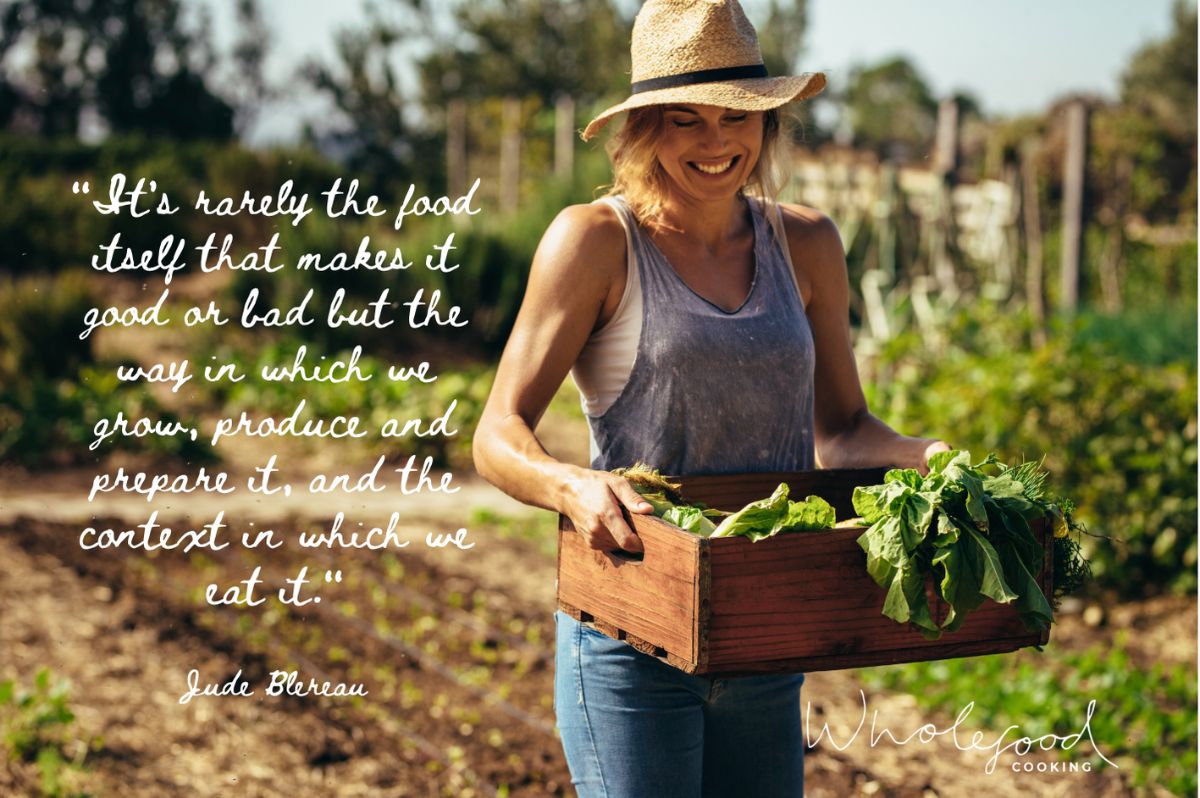Good, wholesome and nourishing food is not only WHAT it is, but HOW and WHY it is.

Labelling a diet vegetarian, vegan, gluten free, dairy free or raw, is no guarantee of a healthy, wholesome or nourishing diet.
It’s very easy to become confused by the many dietary and lifestyle pardigms that about, each telling us that their path is more ethical, sustainable, healthier, or wholesome.
Ultimately, it’s never that black and white, or never that simple.
I believe there are more important fundamental truths that form the basis of healthy, wholesome and nourishing eating…
Nourishment begins in a fields rich soil and foods should be organic, biodynamic or regenerative (what it always used to be before big business got hold of it). This will increase its nutrient density (nutrients are what your body runs on) and reduce the pesticide load.
That the food you eat, actually is good enough to eat: that is, synthetic pesticides, fungicides, herbicides are not compatible with any part of a human system, but are designed to interrupt and kill living systems. You are a living system.

That farming sustainably, in harmony and with respect for nature and our planet, is simply how food used to be grown before big business got hold of it. Once harvested, nothing harvested is added to it (fungicides in storage for example). This also includes animal and fish products. In buying food grown in this manner, we also seek to walk lightly on the earth and to live within an ecosystem rather than to control it. Food grown in this matter is also pretty much your only assurance that what you are eating is not genetically engineered.
That it should be real: that is, made with real and true ingredients rather than chemicals that mimic them. The human body has evolved to eat a real strawberry, not a strawberry flavour made from chemicals. There are many toxic chemicals in the additives, flavours, colours and preservatives used in the production of food. Most food commercially available today is ‘Matrix Food’ – all illusion.

That the food you choose should be prepared appropriately to ensure compatibility with the human body: that is low fat milk, pasteurised milk, refined oils, fractionalised foods are not understood by the body. Some foods (such as beans or grains) require special preparation methods to ensure they are understood (digestible).
That it should be as close as possible to it’s natural state – with as little that is edible removed and as little that is inedible (additives etc) added to it. The whole is always far, far greater than simply the sum of nutrient parts and includes those parts we cannot see. When food is refined, there are nutrient losses and no ‘enriching’ or adding back will make it whole again. But, more importantly, when a food is whole, with all the ‘parts’ (vitamins, minerals, fat, fibre, protein, carbohydrate, and the known and unknown) nature has put there intact and in their original ration, optimum effectiveness is ensured. Milk is a good example: fat is an essential component of milk containing the fat soluble vitamins A and D, which are essential for assimilation of calcium and protein.
That it should match you – eat to suit your body; this is a fundamental Ayurvedic premise – no one diet is right for everybody. For example dairy, wheat or other grains or meat will not suit everyone. Some will be fine with cold, raw food in winter or summer, others will suffer – some do best with cooked vegetables. Some thrive on meat, others not.
That it should be delicious – Food is far more than its actual physical nutrients. Fractionalising food into its components and eating what may be considered the healthiest meal on the planet, can never satisfy, fulfill and truly nourish if it is not enjoyed. Deliciousness, in ways I do not understand but absolutely know exist, allows food to be taken in and properly digested, absorbed and utilised by the body. As noted, deliciousness is a nutrient in its own right. Deliciousness also includes not being so stressed out (from a too busy life), that you are unable to experience deliciousness in other walks of life. Equally though, the most delicious and enjoyable meat cannot nourish if there are no nutrients present. Both aspects make up what I consider to be healthy, wholesome food.

That good gut ecology counts and is a fundamental pre requisite for good health.
That sweetness is not a dirty word: that is, a bit of wholesome sweetness, cake or dessert in a whole and balanced diet is not going to kill you. Eating a lot of shallow, nutrient deficient, refined, additive laden food will.

